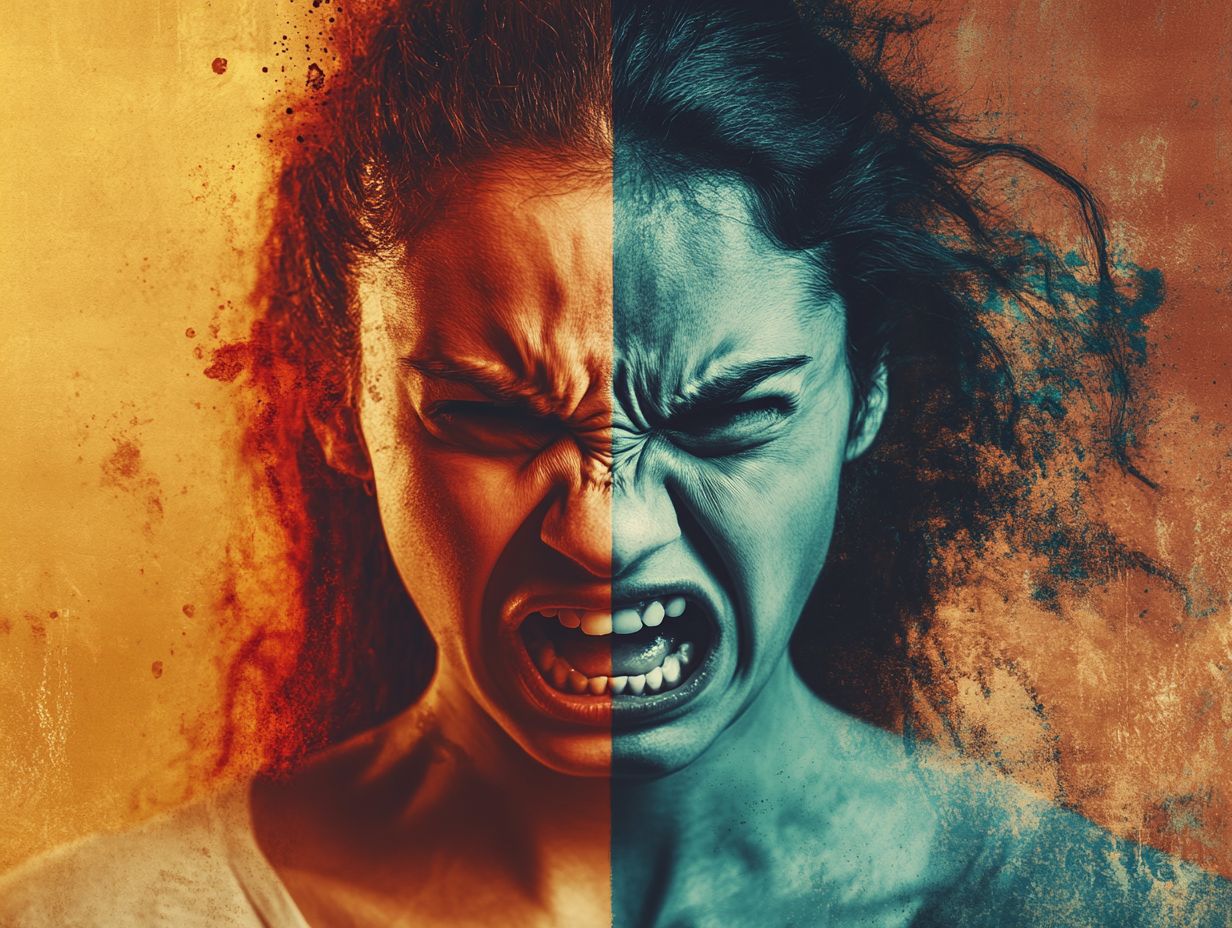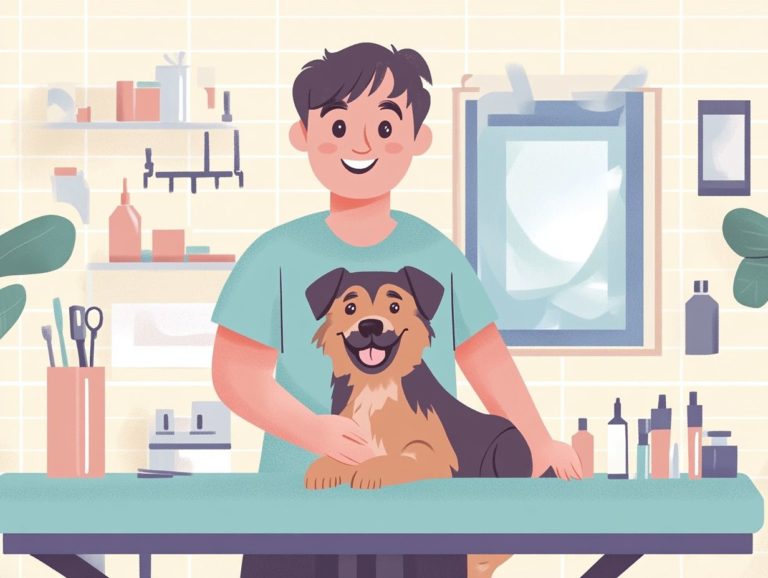What is the Relationship Between Anxiety and Aggression?
Anxiety and aggression are two intricate emotional responses that often intertwine, creating a range of challenges for mental health. Anxiety typically presents itself as unease and apprehension, while aggression may manifest as irritation, hostility, or anger.
Understanding the subtle differences between these emotions is crucial, as they can arise from distinct environmental and biological factors.
This article delves into their definitions, explores their impact on mental health, discusses treatment options, and outlines effective management strategies. It aims to empower you to navigate these intertwined experiences towards a healthier mindset while considering the correlation between academic pressure and emotional health.
Contents
- Key Takeaways:
- Understanding Anxiety and Aggression
- Causes of Anxiety and Aggression
- Impact of Anxiety and Aggression on Mental Health
- Treatment Options for Anxiety and Aggression
- Managing Anxiety and Aggression
- Preventing Anxiety and Aggression
- Frequently Asked Questions
- What is the Relationship Between Anxiety and Aggression?
- Can anxiety cause aggression?
- How does aggression manifest in someone with anxiety?
- Is there a link between anxiety and reactive aggression?
- Can anxiety and aggression be treated together?
- What are some coping strategies for managing anxiety and aggression?
Key Takeaways:

- Anxiety and aggression are distinct but interconnected emotions. Anxiety can fuel aggression, and aggression can exacerbate anxiety.
- Both environmental and biological factors contribute to anxiety and aggression, highlighting the importance of a holistic treatment approach.
- Mental health disorders, such as PTSD and OCD, are often associated with anxiety and aggression, emphasizing the need for prompt and effective treatment.
Understanding Anxiety and Aggression
Understanding anxiety and aggression is vital, especially among adolescents, as these emotional responses strongly affect their mental health and overall well-being.
Anxiety often arises from stressors like academic pressure and social challenges. Conversely, aggression can take various forms, including physical, verbal, and relational expressions.
Differentiating between these emotional states is essential for effectively identifying and addressing behavioral disorders, which are conditions that affect how a person acts. Untreated anxiety can escalate into heightened hostility and aggression, potentially manifesting as indirect aggression in young individuals.
Recognizing these nuances can help you support healthier emotional development and address potential risk factors associated with behavioral problems.
Defining and Differentiating the Two
Defining and differentiating anxiety and aggression is essential for grasping how these two emotions interact, particularly in adolescents who often experience both in response to various stressors.
Anxiety is marked by excessive worry and fear and can take on numerous forms, including generalized anxiety disorder and social anxiety. Almost one in three adolescents face anxiety issues, affecting nearly 31.9% of this age group, as reported by the National Institute of Mental Health.
Aggression can be broken down into several types:
- Verbal aggression, which involves threats or insults,
- Physical aggression, encompassing any form of violence,
- Indirect aggression, such as spreading rumors, and
- Relational aggression, aimed at damaging someone’s social relationships.
Research indicates that around 40% of adolescents engage in some form of aggression, whether verbal or physical. This highlights the critical need to understand these behaviors, as they often intertwine with anxiety, creating complex emotional and social challenges for young individuals.
Causes of Anxiety and Aggression
The causes of anxiety and aggression among adolescents are complex and multifaceted. These emotions are often linked to demographic factors and significant associations in various studies. They frequently arise from a blend of environmental influences and biological factors that shape emotional responses in different situations, particularly during times of academic pressure.
Understanding this interplay provides valuable insights into their experiences and behaviors, especially within the context of cross-sectional studies.
Environmental and Biological Factors
Environmental and biological factors play a crucial role in shaping experiences of anxiety and aggression. They influence mental health through various channels.
Family dynamics, including parenting styles and sibling relationships, establish a foundation for emotional regulation and coping mechanisms. For instance, research shows that coming from a chaotic home environment, characterized by poor communication or conflict, increases the likelihood of experiencing anxiety and aggressive behaviors.
The pressures of academics and peer interactions at school can further intensify feelings of inadequacy and hostility.
Genetic predispositions also play a significant role. You may inherit traits that make you more vulnerable to these stressors, amplifying emotional responses and potentially leading to higher aggression scores. Case studies of adolescents navigating these combined influences reveal the intricate interplay between nurturing environments and biological inheritances in shaping mental health outcomes.
Impact of Anxiety and Aggression on Mental Health

Anxiety and aggression can heavily impact mental health, especially for adolescents. This demographic often finds themselves more susceptible to developing prevalent mental health disorders like depression and various behavioral issues stemming from these emotional struggles.
Common Mental Health Disorders Associated with Anxiety and Aggression
Common mental health disorders linked to anxiety and aggression include anxiety disorders and depression. They often manifest in adolescents in unsettling ways, such as relational aggression and behavioral issues.
Take generalized anxiety disorder (GAD); it can lead to excessive worry, which might trigger irritability and aggressive outbursts, significantly impacting peer relationships. Research reveals that around 31.9% of adolescents grapple with anxiety disorders, while a staggering 13% face the harsh reality of depression both of which can heighten feelings of aggression.
Those dealing with social anxiety may resort to indirect forms of aggression, such as excluding peers, as a way to cope. Recognizing these connections highlights the critical need for early intervention and support. Acting fast can break the frustrating cycle of volatile behaviors.
Treatment Options for Anxiety and Aggression
Treatment options for anxiety and aggression are extensive and encompass a range of therapies and medications designed to alleviate symptoms and enhance overall mental health.
These approaches are tailored to meet individual needs, promoting a pathway toward healing and resilience.
Therapies and Medications
Therapies and medications are key in treating anxiety and aggression, with cognitive behavioral therapy (CBT) standing out as one of the most recommended approaches for adolescents. This method helps identify and reshape negative thought patterns, equipping you to manage emotional responses more effectively during challenging situations.
Pharmacological options, such as selective serotonin reuptake inhibitors (SSRIs), are effective in alleviating symptoms associated with both anxiety and aggression. For example, a compelling case study illustrates significant improvements in a 15-year-old’s social engagement when combining CBT with SSRIs, showcasing the power of integrated treatment plans.
Experts consistently stress the importance of tailoring these interventions to your unique needs, ensuring a comprehensive approach to your mental health.
Managing Anxiety and Aggression
Managing anxiety and aggression is essential for enhancing mental health outcomes in adolescents. It calls for effective coping strategies that address both emotional responses and behavioral challenges.
By honing these skills, you can create a more supportive environment for growth and well-being.
Strategies for Coping and Reducing Symptoms

Strategies for managing and alleviating symptoms of anxiety and aggression can profoundly enhance your emotional responses and overall mental health. This fosters resilience against behavioral problems.
One particularly effective approach is mindfulness. By focusing on the present moment, you can gain greater control over your thoughts and feelings. Research has shown that practicing mindfulness can significantly reduce anxiety levels and improve emotional regulation.
Regular exercise stands out as a powerful remedy. Get moving! Physical activity releases feel-good endorphins, which foster a sense of well-being. Studies indicate that maintaining a consistent workout routine can effectively alleviate symptoms of both anxiety and aggression.
Moreover, cultivating social support through friendships and family connections creates a vital safety net. This support helps you share your feelings openly and receive encouragement, ultimately fostering greater resilience in the face of challenges.
Preventing Anxiety and Aggression
Preventing anxiety and aggression is crucial for fostering healthy emotional development in adolescents. It s essential to implement effective preventive measures and make lifestyle changes that tackle the root causes of these challenges.
By focusing on these foundational aspects, you can create a supportive environment that nurtures resilience and emotional well-being in young individuals.
Preventive Measures and Lifestyle Changes
Preventive measures and lifestyle changes can dramatically reduce the risks associated with anxiety and aggression in adolescents, paving the way for healthier behaviors.
- Consider implementing educational programs in schools that emphasize understanding emotions and address behavioral disorders. These programs can equip young individuals with essential skills to identify and manage their feelings effectively.
- Engage with community initiatives, such as workshops or support groups that promote peer communication and discuss issues like relational aggression. These initiatives foster a sense of belonging and alleviate feelings of isolation.
- Family support systems are equally crucial. Maintaining open lines of communication creates a safe space for adolescents to express their emotions freely.
- Encouraging healthy lifestyle changes such as regular physical activity, balanced nutrition, and mindfulness practices can significantly enhance emotional resilience, enabling teenagers to tackle challenges with greater ease.
Frequently Asked Questions
What is the Relationship Between Anxiety and Aggression?
The relationship between anxiety disorders and aggression is complex and can vary depending on the individual. In general, anxiety can heighten feelings of hostility, making people more prone to aggressive behavior.
Can anxiety cause aggression?

Yes, anxiety can cause aggression. When someone is experiencing anxiety, especially in stressful situations, they may feel a sense of threat or danger. This can trigger a fight or flight response, leading to aggressive behavior as a way to defend or protect oneself.
How does aggression manifest in someone with anxiety?
Aggression can manifest in various ways in someone with anxiety. This may include physical aggression, verbal aggression, or passive-aggressive behavior. It may also appear as irritability, anger, or hostility.
Is there a link between anxiety and reactive aggression?
Yes, there is a strong link between anxiety and reactive aggression. Reactive aggression refers to aggressive behavior that is a response to a perceived threat or provocation. Anxiety can heighten this response, making individuals more likely to react aggressively in certain situations.
Can anxiety and aggression be treated together?
Yes, anxiety and aggression can be treated together. Treatment options include therapy, medication, and coping strategies for both anxiety and aggression.
What are some coping strategies for managing anxiety and aggression?
Effective coping strategies for anxiety and aggression include deep breathing exercises, mindfulness, and assertiveness training. Addressing root causes like stress or trauma is crucial for how we feel and manage our emotions.
Seeking professional help is also beneficial for developing effective strategies and speeding up your journey to emotional well-being!






